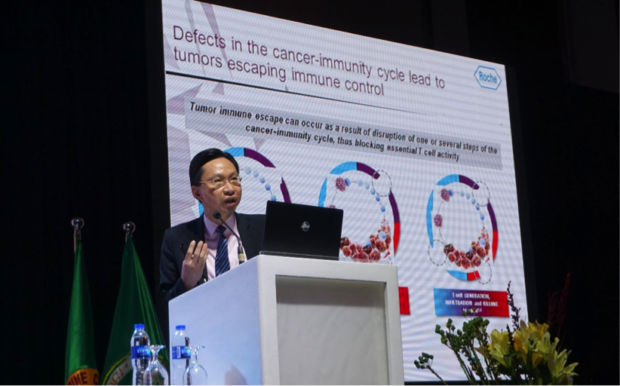As we observe the Global Lung Cancer Awareness Month this November, Filipinos need to be more aware of lung cancer, how it is diagnosed, and the latest treatment options available for patients.
According to the latest statistics as of 2018, lung cancer remains to be the most common cause of cancer-related deaths in the Philippines. Most cases of lung cancer present at an advanced stage of disease, when it is already metastatic and surgery is not an option anymore. Lung cancer can be broadly classified into two major types – non-small cell lung cancer (NSCLC) and small cell lung cancer (SCLC). NSCLC is far more prevalent accounting to up to 85% of all lung cancer cases. Some of the current available treatment options are surgery, chemotherapy, targeted therapy and immunotherapy.

At a recently concluded medical symposium held during the annual convention of the Philippine Society of Medical Oncology (PSMO), pharmaceutical company Roche shared findings on its Philippine Food and Drug Administration (PFDA)-approved drug Atezolizumab as one of the treatments available for patients with locally-advanced or metastatic non-small cell lung cancer (NSCLC) after prior chemotherapy. Patients must first consult and seek further information with a medical oncologist to know if they are viable to take Atezolizumab as it is a prescription drug.
Atezolizumab in NSCLC patients regardless of PD-L1 status
For years, researchers have studied the role the immune system plays in addressing cancer. Immunotherapy drugs such as Atezolizumab may help a person’s own immune system fight cancer. These innovative treatment options help restore cancer immunity to improve outcomes for patients. Atezolizumab adds to the treatment options available for second-line treatment of NSCLC regardless of a patient’s PD-L1 status.
After initial diagnosis, NSCLC patients are further tested to check for genetic mutations to help guide treatment options. One of the mutations is in a gene called PD-L1. PD-L1 interacts with another molecule, PD-1 allowing cancer cells to escape from the cancer-killing capabilities of our immune system. With its mechanism of action of blocking PD-L1, Atezolizumab reinvigorates the body’s immune system to recognize and destroy cancer cells.
Dr. James Ho, a consultant from University of Hong Kong and member of the International Association of the Study of Lung Cancer, presented the latest research on the use of Atezolizumab in NSCLC. The results presented were from the large randomized Phase III OAK and randomized Phase II POPLAR studies, which showed improved outcomes for patients with NSCLC after prior chemotherapy. Atezolizumab was shown to improve overall survival for patients regardless of PD-L1 status. The OAK trial showed an improved median overall survival of over 4.2 months, longer than patients treated with chemotherapy alone. In conclusion, Dr. Ho highlighted that Atezolizumab helped improve survival rates with less risk for immune-related adverse effects versus chemotherapy.
Other adverse events associated with the use of Atezolizumab in patients with metastatic non-small cell lung cancer may include, but are not limited to, the following: fatigue, decreased appetite, dyspnea, cough, nausea, musculoskeletal pain and constipation.
Those prescribed with Atezolizumab may enroll in Roche’s patient support program, with their oncologist’s referral and by fulfilling a set of standard requirements as prescribed by the program’s nurse coordinator. Once enrolled, patients may avail of discounts on Atezolizumab throughout their treatment through accredited sub-distributors and hospitals.